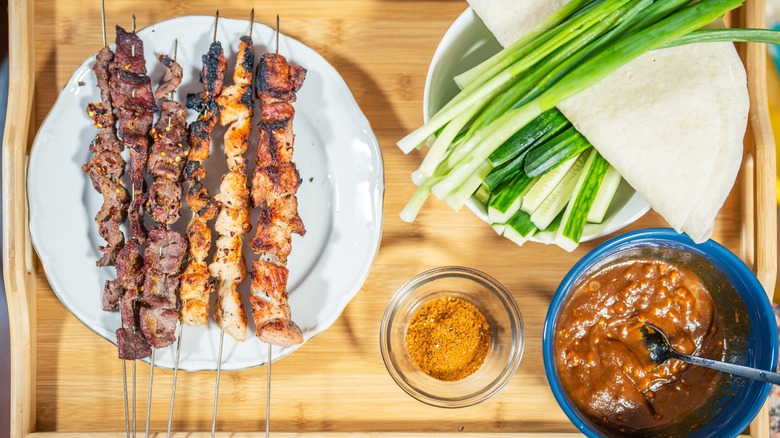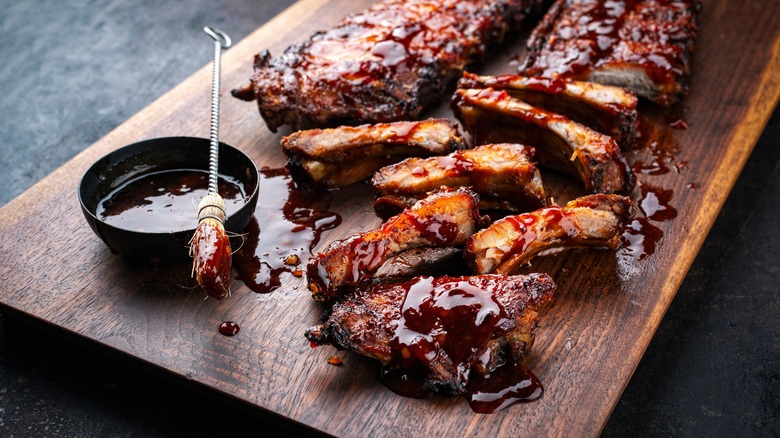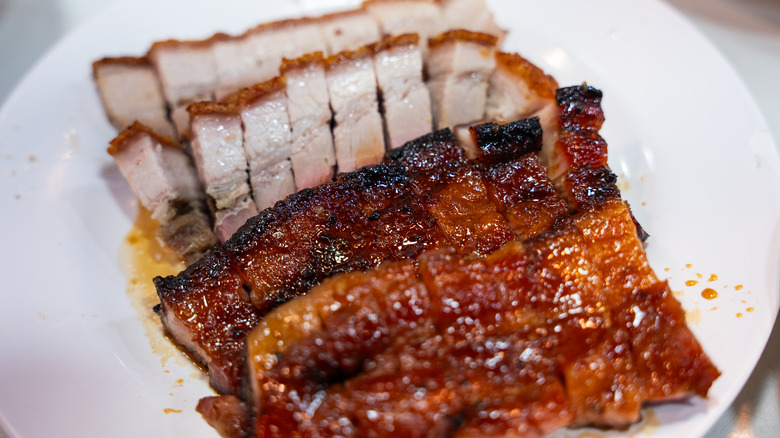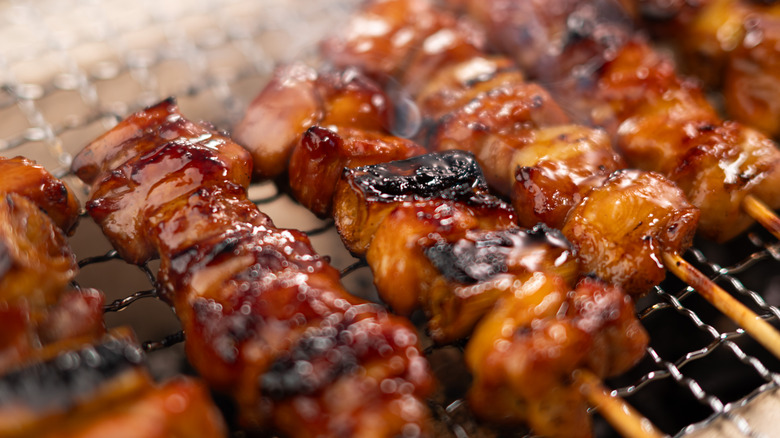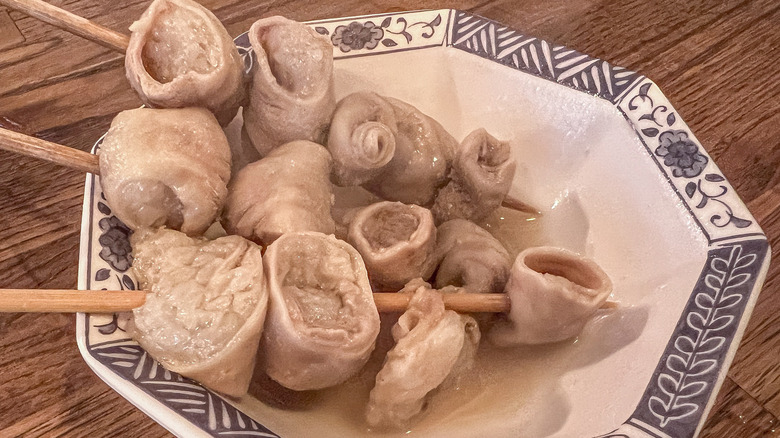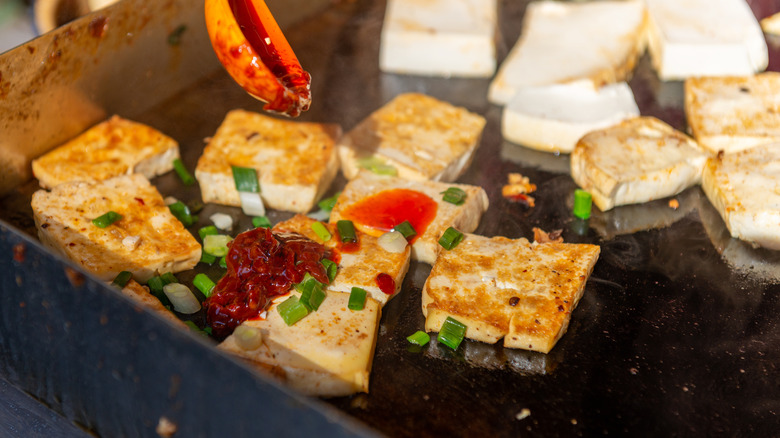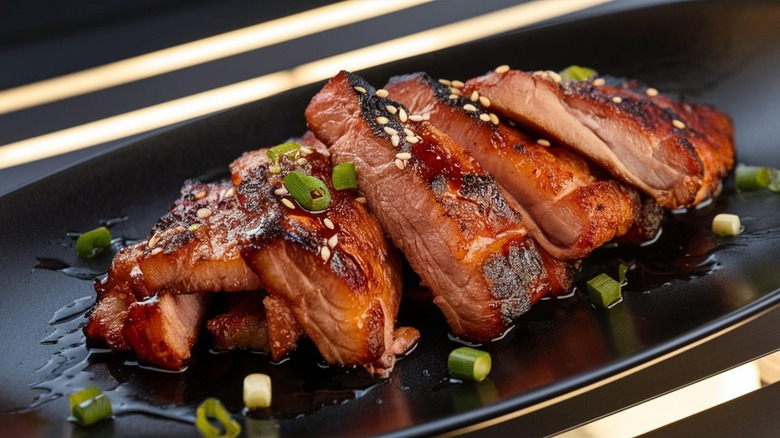What Sets Chinese BBQ Apart From American?
Barbecue plays a big role in American cuisine. For many, it makes us think of Southern barbecue traditions, pitmasters with giant sauce brushes fawning over massive hunks of pork and beef. However, not all barbecue is created equal. In China, barbecue is an integral part of the food and social culture, and while it shares a few similarities with American-style barbecue, it's really an art all on its own.
Take yourself out for a meal of Chinese barbecue and you'll be both surprised and delighted by what's put in front of you. Keep an open mind — if you're going into it expecting pulled pork sandwiches, fatty slices of brisket, burnt ends, and squeeze bottles of barbecue sauce, you may be disappointed. Chinese barbecue is its own nuanced type of culinary experience that deserves as much love and admiration as Southern-style barbecue does in America. For the out-going eater who can get on board with perfectly grilled pork skewers, brightly seasoned chives, and perhaps a few chicken hearts too, Chinese barbecue should most definitely be on your radar.
What is American barbecue?
In the simplest of explanations, American barbecue (or barbeque, depending on where you're from) is the act of cooking meat low and slow over an indirect, open flame. According to Smithsonian Magazine, it was Christopher Columbus in the 1500s who encountered indigenous tribes on the island of Hispaniola engaging in this cooking method, heating their food on green wood rather than directly over the fire so as to not burn it. Today, there are many fairly distinct styles of American barbecue, such as Carolina, Texas, Memphis, and Kansas City — and each have their own variations.
The differences between these barbecue styles are rich in history and nuance, with each inspired by different cultures and culinary styles. Vinegar and mustard dominate the flavor and texture profile of Carolina sauce, while tomato and molasses are prominent in Memphis sauce. These two styles also focus primarily on whole hog barbecue, while Texas is all about the beef. And when it comes to Kansas City, you'll find a little bit of everything, resulting in a sort of east meets west situation. The one thing these four styles all have in common? They all think their barbecue is the best.
What is Chinese barbecue?
Continuing to the far east all the way to China is a different style of barbecue entirely. Chinese barbecue is the generic term in Cantonese cuisine for spit-roasted meats over an open flame or in a rotisserie-style oven. The sauces used in Chinese barbecue are rich and deeply flavored, and each type of meat gets its own type of sauce.
As far as proteins go, there's really no limit to what you'll find at a Chinese barbecue restaurant. Pig, duck, goose, chicken, and even cuttlefish are bound to show up on a menu, prepared in either the roasted or rotisserie fashion and accompanied by a side of rice, steamed veggies, or stir-fried noodles. Additionally, more often than not, you'll find your roasted meats cooked over a flame kebab-style and served on a skewer rather than on a plate.
Most Chinese bbq comes in the form of kebabs
The word barbecue can conjure a lot of different visions in our heads. For most of us, we think of big ole hunks of brisket cooking low and slow in a smoker behind a restaurant. After it's become extremely moist and tender, we picture the pitmaster slicing it up, fat glistening throughout, and finally, slathering it in barbecue sauce. Chinese barbecue, however, is more about meat on sticks. There are a number of variants of Chinese barbecue, but most of the meats and veggies will be served up in kebab form. The history of the kebab in China goes back about 1,800 years, with the reasoning being that the nomadic peoples wanted food they could prepare quickly and eat on the go.
While some of us might picture Turkish or general Middle Eastern food a la kebab, the Chinese have been eating this way for centuries, likely as a result of the Turks bringing skewers to the Han Dynasty via the silk road, according to Kade Maijala on Medium. Regardless of how or when skewering meat became a part of Chinese barbecue, it's crucial to the enjoyment of this style of eating. No matter what you happen to order, from beef and pork to fish and veggies, chances are, it's coming to you on a stick.
Organ meat is just as common as pork, beef, and chicken
Above all else, Chinese barbecue is all about the meat. Pork belly, grilled chicken, beef, fish, and any other number of proteins abound, but if you're really looking to get the real deal experience, there's an offal-ly adventurous under belly you'll need to explore. Chicken hearts, brains, kidneys, tendons, and pig skin are just some of the organ meats you're bound to encounter during your Chinese barbecue meal. Not only are these off-cuts of meat tended to with the same care and flavor as the rest of the animal, they are a rather delicious example of waste-free eating — using every bit of the beast rather than throwing anything out.
While the idea of chowing down on hearts and kidneys may sound unappetizing, there's more to them than meets the eye. They're often chewier than other cuts of meat yet quite flavorful, and when cooked with spicy seasoning and sauces, they're unmissable.
There are plenty of vegetarian Chinese barbecue options
When you hear barbecue, you probably think meat. That's entirely normal and very much expected; however, not all of us are carnivores, and thankfully, Chinese barbecue is an inclusive eating experience, with a little something for every type of eater. If you don't eat meat or simply want to veer away from the pork belly and fatty beef of the meal, you're in luck: Chives, mushrooms, cucumbers, and more veggie options are just as common as the meaty ones. Additionally, you'll be hard-pressed to find a Chinese barbecue joint that doesn't offer at least a few good tofu options.
If you are a meat eater, consider ordering a few of the vegetarian options if for no other reason than to get some variety. Spicy pan-fried tofu will melt in your mouth as you envelop your taste buds in deep, rich flavor. Barbecue rice cakes, eggplant, and even seitan sausage are seasoned and cooked with as much care as its meaty counterparts, so if you aren't going for the full carnivorous experience, you won't be missing out.
Booze is a crucial part of the Chinese barbecue experience
Perfectly grilled, juicy pork skewers are a can't miss part of eating Chinese barbecue, but you know what else is too? Beer. In this respect, Chinese barbecue does share a similarity with American barbecue, as both grilled meat options are beautifully complemented by an ice cold beer. However, for Chinese barbecue, it's really what makes the eating experience complete.
Gather your friends at your favorite Chinese barbecue spot, order as many skewers as your hungry eyes and bellies can fathom, order a few more, and then top it all off with a pitcher of beer or a bottle of ice cold Baijiu. In the most general sense, Chinese barbecue is about getting together with friends, indulging in as many kebabs as possible, and cheersing to it all with a pint (or perhaps a few). Especially if you're planning to go for some of the spicier options, nothing will tamp down that heady heat like a cold Tsingtao.
Chinese barbecue sauce is stickier and sweeter
One of the most well-known chinese barbecue dishes is char siu — a popular Cantonese dish that tends to show up alongside stir-fried noodles or steamed rice or inside a steamed bun. Fatty pork belly is marinated in the sweet char siu sauce, roasted, and then glazed in that same sauce for a crisp crust on the outside and tender, juicy meat on the inside. The secret ingredient in the sauce that makes it so sweet and sticky? Maltose. The naturally-occurring sugar gives the meat its signature shiny glaze and, unlike typical American barbecue sauce, the focus in the Chinese barbecue sauce is more about this sticky sweetness than anything else.
While American barbecue sauce certainly has a sweetness to it, many versions are vinegar-based for a slightly thinner consistency and a more sour flavor. Chinese barbecue sauce, however, is typically made with oyster sauce, hoisin sauce, and soy sauce, making this a more viscous coating with a sweeter flavor to cut through all that rich, fatty meat.
